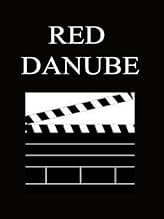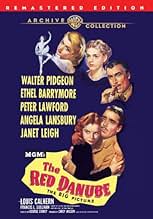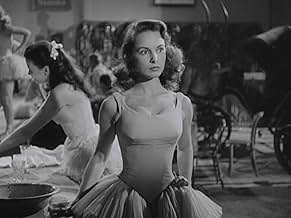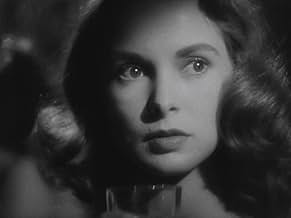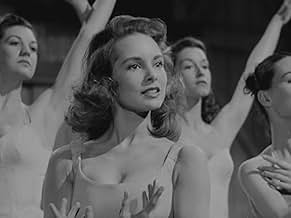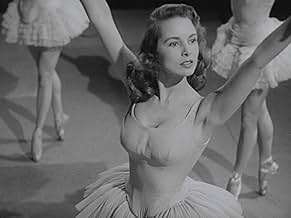Shortly after the end of World War II, British Colonel Michael S. "Hooky" Nicobar (Walter Pidgeon) is assigned to a unit in the British Zone of Vienna. His duty is to aid the Soviet authorit... Read allShortly after the end of World War II, British Colonel Michael S. "Hooky" Nicobar (Walter Pidgeon) is assigned to a unit in the British Zone of Vienna. His duty is to aid the Soviet authorities to repatriate citizens of the Soviet Union, many of whom prefer not to return to their... Read allShortly after the end of World War II, British Colonel Michael S. "Hooky" Nicobar (Walter Pidgeon) is assigned to a unit in the British Zone of Vienna. His duty is to aid the Soviet authorities to repatriate citizens of the Soviet Union, many of whom prefer not to return to their home country. Billeted in the convent run by Mother Auxilia (Ethel Barrymore), Nicobar, a... Read all
- Nominated for 1 Oscar
- 5 wins & 1 nomination total
- Lt. Guedalia-Wood
- (as David Hydes)
- Major
- (uncredited)
- Devout Pilgrim
- (uncredited)
Featured reviews
The Red Danube came out in 1949 and is set at the time when people thought it possible to keep the wartime Allies on the same page. That was not to be due to the differences in the two political systems that combined to defeat Hitler.
Walter Pidgeon is recently transferred to Vienna and gets an order to find her and turn her over to the Russians. He doesn't count on three things, his aide Peter Lawford falling for Janet, the formidable presence of Mother Superior Ethel Barrymore who is sheltering Leigh, and his own growing conscience about what he sees around him.
People would rather die than return to the worker's paradise that Communism has created. I mean literally, both here in the film and in real life back in the day. It's easy to dismiss The Red Danube as a Cold War inspired film. But the situations are way too real.
Best performance in the film is Ethel Barrymore, followed closely by Pidgeon as the British Colonel with a conscience. Pidgeon is a nonbeliever and his debates with Barrymore about religion are the best thing in the film.
Part of the film has Pidgeon getting Barrymore on a military plane to see the Pope in Rome during a conference concerning refugees. Now mind you this is Pius XII we are talking about who before and as Pope never quite saw the danger Hitler was to the church that Stalin was.
But I'm willing to bet that seeing Ethel Barrymore delineate the character of the Mother Superior this was a woman who walked the Christian walk as well. I'm even willing to bet she probably sheltered a few Jews during the holocaust as well.
I found others' comments on the relationship to McCarthyism and/or anti-Communism in general to be interesting. I do believe this movie showed the evils of the Soviet system, which to me, is fine. I have no idea if it fed McCarthyism, since I wasn't alive during that period. However, to me, it seems to be more about anti-totalitarianism of all stripes, rather than merely anti-Communism. In particular, the scene of the refugees in boxcars seems to be a direct reference to the Holocaust.
That The Red Danube was nominated for best art direction speaks, as well, to the technical beauty of this black & white film. This film reminded me of The Third Man, in its location, art direction, and storyline. (Orson Welles always said that "Black & white is the actor's friend" -- how true, in both these movies!) Although this film is inferior to The Third Man overall, in terms of its acting, atmosphere, and skill of the director, it is still worthy of viewing. Whereas The Third Man focuses on the moral dilemma of dealing with the evil in one individual (in a corrupt society), this film deals more generally with the morality of living in a corrupt society. In other words, The Third Man asks: "Why do men turn evil in an evil society?" (which, when you think about it, may not be such a profound question; although the further question of "What can be done about it?" is also explored), whereas The Red Danube asks: "How can men stay good in an evil society?" (which is really a much more useful question). So, although there's no denying that The Third Man is the better movie overall, I would highly recommend The Red Danube due to its high production values, the collection of wonderful actors in its ensemble cast, and a very engaging, philosophical script.
Did you know
- TriviaKonstantin Shayne (Professor Bruloff) and Tamara Shayne (Helena Nagard) play husband and wife; in reality are siblings.
- GoofsMelville Cooper's role is credited as "Private David Moonlight", but his uniform bears Sergeant's stripes throughout the movie.
- Quotes
Mother Superior: [Referring to a previous conversation about religion and its inefficacy in wartime] Like that ladder...
Col. Michael S. 'Hooky' Nicobar: The ladder?
Mother Superior: There is the ladder, there is the ceiling and there is the paint. If you want the ceiling painted, someone must climb the ladder.
Col. Michael S. 'Hooky' Nicobar: Yes, you, um, need a painter.
Mother Superior: But suppose the painter remains at the foot of the ladder? You cannot say that the ladder has failed you, or the paint has failed you, or the ceiling has failed you.
Col. Michael S. 'Hooky' Nicobar: No, no you can't.
Mother Superior: I know about you more than you know about yourself. You want the ceiling painted but... all the cruelty in the world, all the horror and tragedy you see, these you do not oppose with your own courage. You do not try to replace them with your own high hopes for the world and the human race. You complain that God has failed you. No, my friend. God has not failed man- man has failed God. For every man knows what God wants him to do.
- ConnectionsFeatured in Some of the Best: Twenty-Five Years of Motion Picture Leadership (1949)
- SoundtracksOn the Atchison, Topeka and the Santa Fe
(uncredited)
Music by Harry Warren
[Instrumental version played at the tavern in Rome when Audrey and Twingo say goodbye]
- How long is The Red Danube?Powered by Alexa
Details
- Release date
- Country of origin
- Languages
- Also known as
- The Red Danube
- Filming locations
- Rome, Lazio, Italy(backgrounds)
- Production company
- See more company credits at IMDbPro
Box office
- Budget
- $1,961,000 (estimated)
- Runtime1 hour 59 minutes
- Color
- Aspect ratio
- 1.37 : 1
Contribute to this page



